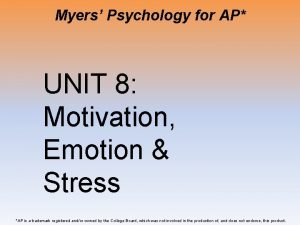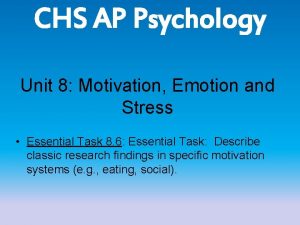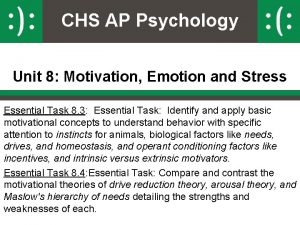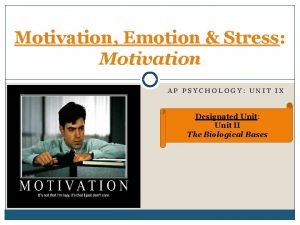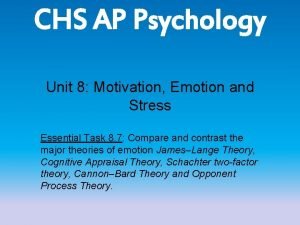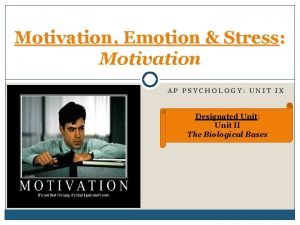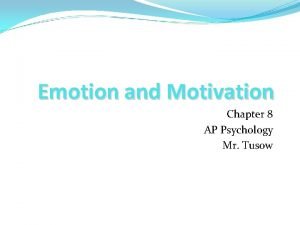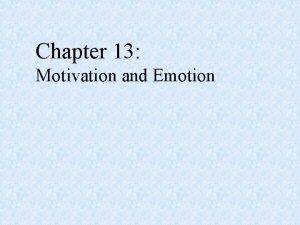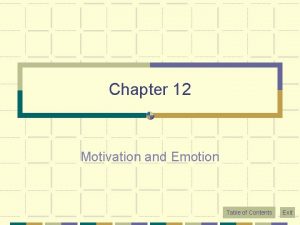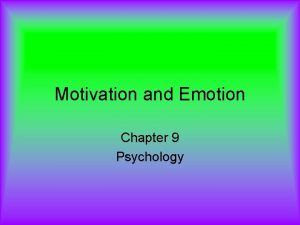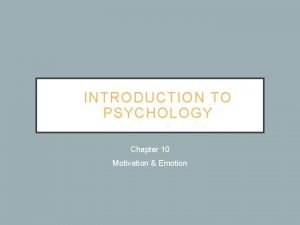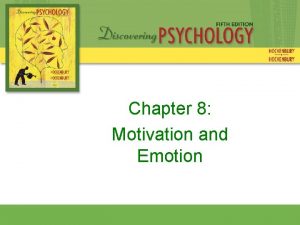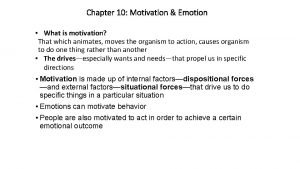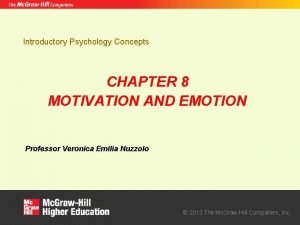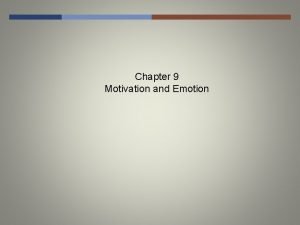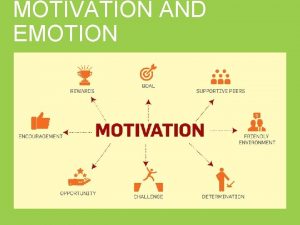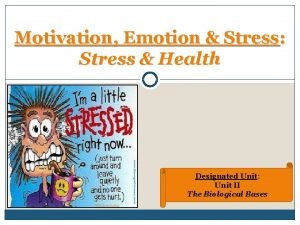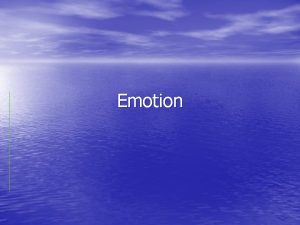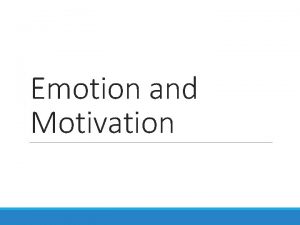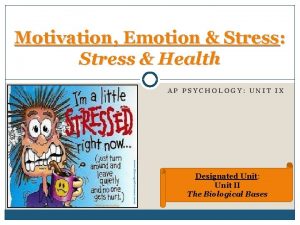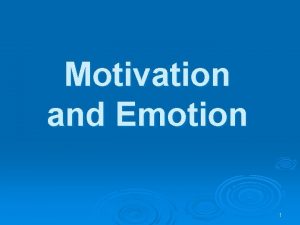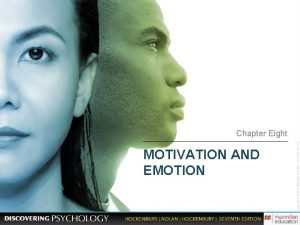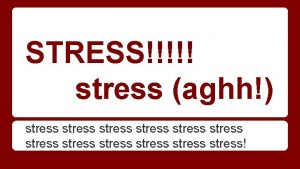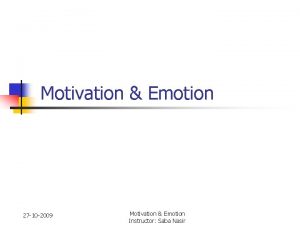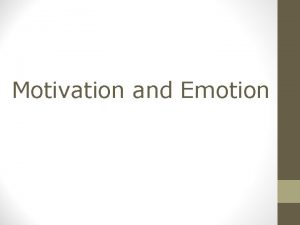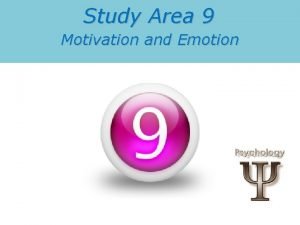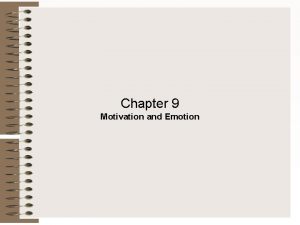Unit 8 Motivation and Emotion and Stress Health
















- Slides: 16

Unit 8: Motivation and Emotion (…. and Stress & Health)


Motivation • Feelings or ideas that cause us to act towards a goal • General term for the biological, emotional, cognitive, and social processes involved in starting, directing, and maintaining behavior

Motivational Concepts (theories) • • • Instinct Theory (now Evolutionary Theory) Drive Reduction Theory Arousal Theory Incentive Theory Cognitive Dissonance Theory ***

Motivational Concepts (theories) Instinct Theory • Instinct Theory: we are motivated by our inborn automated behaviors. • Instinct- unlearned behavior, passed down generation to generation • Darwin’s Evolution (survival of the fittest) • But instincts only explain why we do a small fraction of our behaviors.

Motivational Concepts (theories) Drive Reduction Theory We are “pushed” to reduce our drives and we are “pulled” by incentives- put them together and we are REALLY motivated! • Our behavior is motivated by BIOLOGICAL NEEDS. • Wants to maintain homeostasis. • When we are not, we have a need that creates a drive. • Primary versus Secondary drives

Motivational Concepts (theories) Arousal Theory • We are motivated to seek an optimum level of arousal. • Yerkes-Dodson Law • As stress increases from minimal, performance also increases. • However, one stress reaches a moderately high level, performance peaks. • More stress leads to decreased performance. • Therefore, an optimum level of performance occurs when stress is moderate.

TOPSS Handout 1. 1: Sensation Seeking Scale Motivational Concepts (theories) • Arousal theory assumes that people seek an optimum level of stimulation. • Marvin Zuckerman argued that people differ in the amount of stimulation they need or want and hence in their “sensationseeking” – Moderate levels of arousal are adaptive (normal) but too low or too high is disruptive • Below optimal level motivates behavior to increase arousal • Above optimal level motivates behavior to decrease arousal • We all have a different “optimal level”

Motivational Concepts (theories) Demo: Sensation Seeking Scale (Arousal theory) 4 Forms of Sensation Seeking: 1. Thrill & Adventure Seeking: seek excitement in risky but socially acceptable activities (sky diving); desire for these can predict behavior 2. Experience- Seeking: seek sensation through the mind, senses, and nonconforming lifestyle; free, unusual friends, frequent travel, artistic expression 3. Disinhibition: Those who have chosen middle class lifestyle, but find it boring, so they seek escape in social drinking & partying; “extraverted sensation seeking”(needing other people as sources of stimulation) 4. Boredom Susceptibility- low tolerance for experience that is repetitive and constant; become extremely restless w/long periods with little external stimulation Type T- “Thrill Seeking”; high energy;

Motivational Concepts (theories) Incentive Theory • Behavior can be pulled by a desire to get an incentive (reward) • Incentives = stimuli we are drawn to due to learning – Extrinsic or intrinsic motivations • Why do people try to do well at their jobs? Why do you all try to do well in school? – What is your incentive? What drives this behavior?

Motivational Concepts (theories) Maslow’s Hierarchy of Needs • Abraham Maslow – Humanistic Perspective (human = self) • motivated by needs, and all needs are not created equal. • We are driven to satisfy the lower level needs first • Trying to reach self-actualizationfulfilling one’s potential • Education system <3 s it Humanistic Perspective: • Abraham Maslowhierarchy of needs, self- actualization • Carl Rogers- person/client centered therapy, GAE – genuineness, acceptance, empathy • 1960 s- freewill, be the best you can be (selfactualization), humans are basically good, selfesteem

Motivational Concepts (theories)

Motivational Concepts (theories)

Motivational Concepts (theories) Maslow’s Hierarchy of Needs • Haters gon’ hate (Criticisms): – Cannot explain human capacity for evil – People in 3 rd world countries, starving, yet they still love (belongingness & love needs) & still have esteem (respect for themselves & others) – Concept of self actualization is vague!

Motivational Concepts (theories) TOPSS Handout 1. 2 - Classification of Needs:

Cognitive Dissonance Theory • We are motivated by our beliefs- we want to feel that our beliefs (what we think and feel) are consistent with our actions • If they don’t match- we work until they are! – Dissonance: not in harmony • If what we are thinking is NOT in harmony with what we are doing, saying, or how we are behaving- it causes emotional/mental discomfort (cognitive dissonance)- and we are MOTIVATED to change!
 Myers psychology unit 8
Myers psychology unit 8 Ap psychology unit 8 motivation emotion and stress
Ap psychology unit 8 motivation emotion and stress Ap psychology unit 8
Ap psychology unit 8 Yerkes dodson law ap psychology example
Yerkes dodson law ap psychology example Ap psychology unit 8 test
Ap psychology unit 8 test Unit 8 motivation and emotion
Unit 8 motivation and emotion Hunger motivation ap psychology
Hunger motivation ap psychology Cognitive appraisal psychology definition
Cognitive appraisal psychology definition Chapter 13 motivation and emotion
Chapter 13 motivation and emotion Chapter 12 motivation and emotion
Chapter 12 motivation and emotion Intrinsic and extrinsic motivation
Intrinsic and extrinsic motivation Chapter 10 motivation and emotion
Chapter 10 motivation and emotion Display rules psychology
Display rules psychology Chapter 10 motivation and emotion
Chapter 10 motivation and emotion Chapter 8 motivation and emotion
Chapter 8 motivation and emotion Incentive theory ap psychology
Incentive theory ap psychology Chapter 9 motivation and emotion
Chapter 9 motivation and emotion
